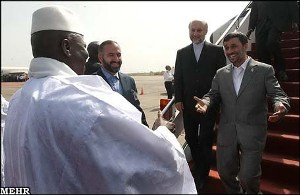Sowing Wind, Harvesting a Storm

Iran and Gambia had been enjoying close relations until the occurrence of this evidence. Since 1994, when Yahya Jammeh toppled the government of Dawda Jawara in a bloodless coup, Gambia established friendly ties with Iran and Jammeh was one of the leaders that attend Organization of Islamic Conference in Tehran in 1997.
Yahya Jammeh was the first head of the country who invited Iran’s president (Ahmadinejad) to be the special guest of the African Union Summit held in Banjul, the capital of Gambia, in 2006. Beside Ahmadinejad, Hugo Chavez was also invited by the Gambian president. Ahmadinejad made two other visits to Gambia, one during a air flight refueling on his way to New York, and one an official visit made in the autumn of last year. Yahya Jammeh has also made two visits to Iran. The two countries are also pursuing construction projects in Gambia.
The geographical features of Gambia raise interests. It is the smallest country in mainland Africa, surrounded on three sides by Senegal and bordering the Atlantic Ocean on the remaining side.
The apparent reason for Gambia’s impromptu decision is said to be the controversy over the Iranian arms cargo confiscated by the government of Nigeria. In his talks with Nigerian officials, Iranian FM Manouchehr Mottaki has explained that the destination of the weaponry had not been Nigeria, but Gambia. I have heard that even Yahya Jammeh sent a special envoy to assure the Nigerians that Banjul, the capital of Gambia, was the final destination of the arms cargo. The Gambian president may have thought that shuttle diplomacy between Iran, Nigeria and Gambia could solve the problem. However, Nigerian officials decided to file a report to the UN Security Council. On the same day that Manouchehr Mottaki spoke of a “misunderstanding” resolved after bilateral talks, Nigeria ordered its UN ambassador to report the incident as a case of a violation of Resolution 1929 –which bans transfer of arms by Iran to other countries. Most probably, Nigeria has referred to Gambia in its report to the UN Security Council. Fearing possible punishment –or perhaps under external pressure—Gambia severed relations with Iran to distance itself from suspicion.
However, in the larger framework, Iran’s diplomatic weaknesses are conspicuous in this incident. The last two months have been bitter for Iranian diplomacy, from Iran’s failure to gain a seat on the UN Women Board, UNESCO’s abstention in joining Iran’s international day of philosophy held in Iran, and the use of the fake name A-R-A-B-I-A-N Gulf (instead of Persian Gulf) in the opening ceremony of Guangzhou Asian Games. Structural defects in Iran’s diplomatic apparatus need a thorough pathology. As long as the current administration has not changed its attitude toward international affairs and believes that it can advance its agenda via fanfare, we should expect such incidents. One who sows wind, harvests a storm.
Javid Ghorban-Oghli is former ambassador to South Africa during Mohammad Khatami’s presidency.

